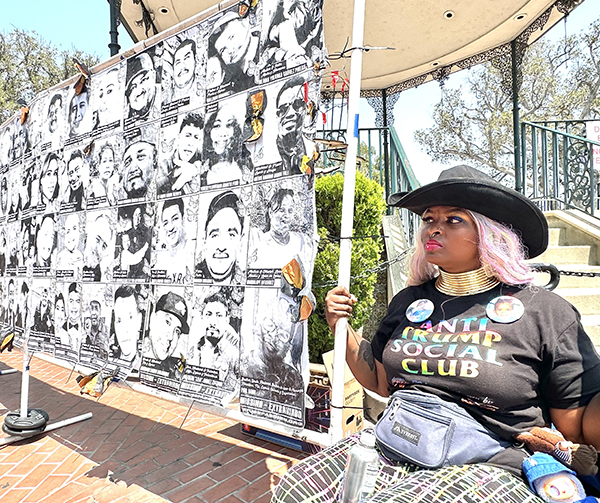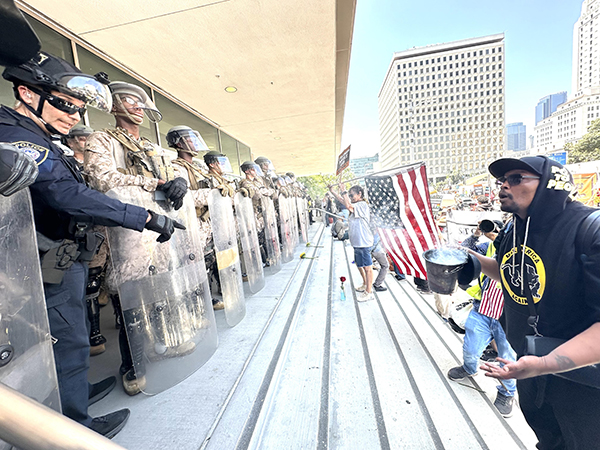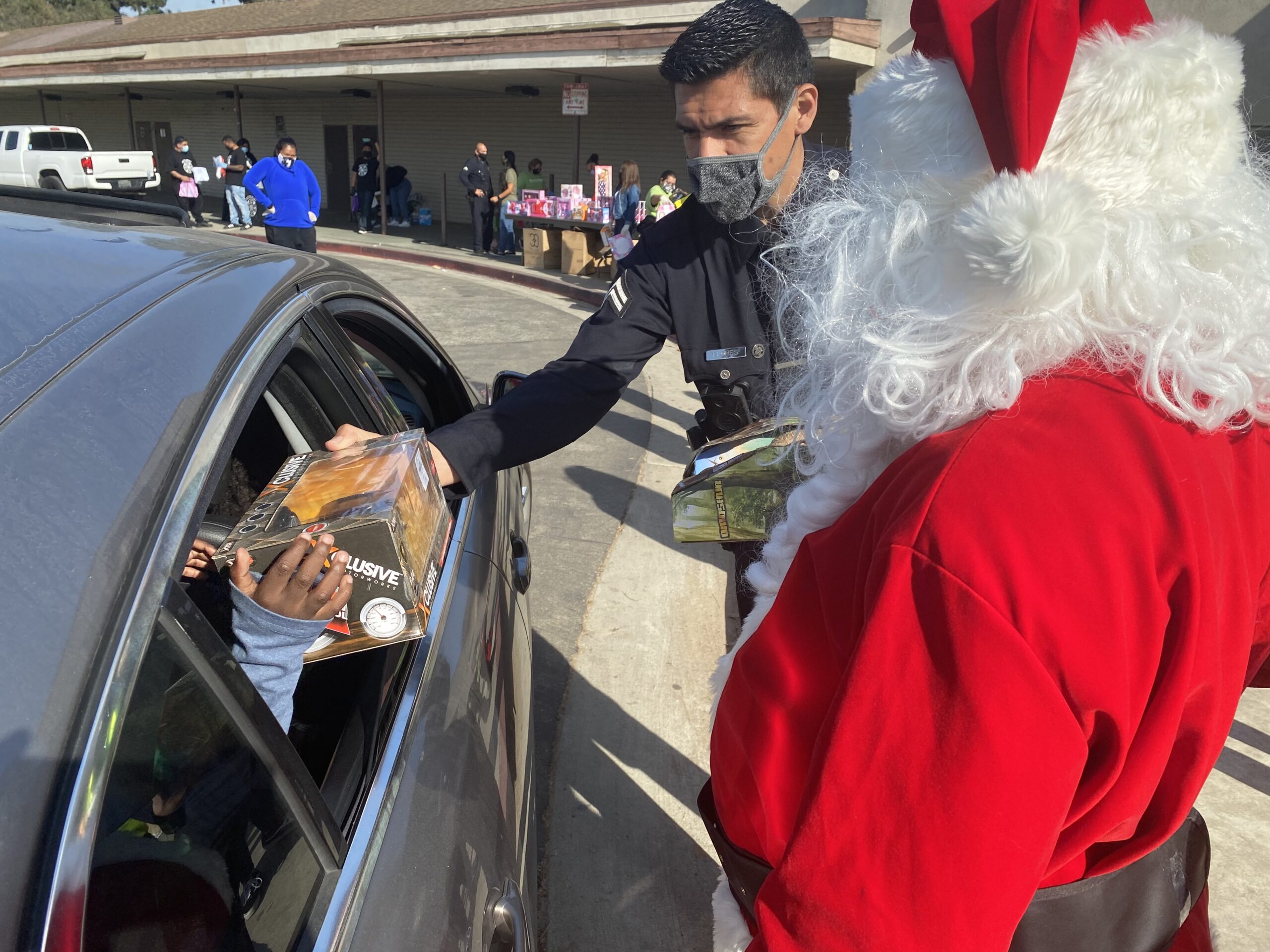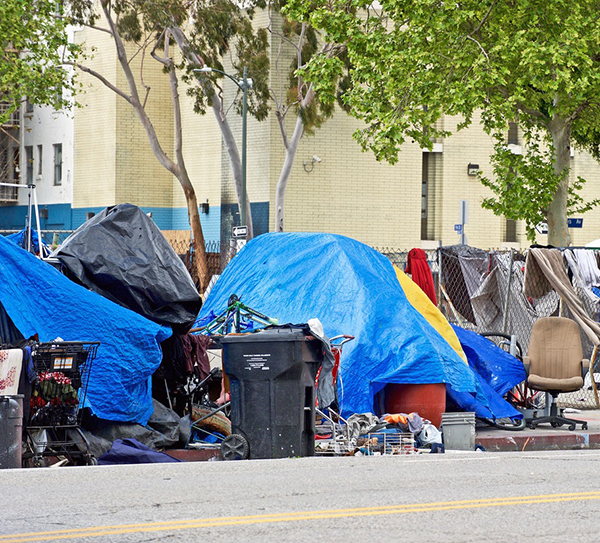Mural of detainees becomes backdrop as National Guard leaves downtown L.A.

LOS ANGELES — Elected officials, led by Mayor Karen Bass, claimed victory July 15 after a Pentagon official announced that 2,000 National Guard troops — half of those deployed by the president — were being released from federal control.
“This happened because the people of Los Angeles stood united and stood strong,” Bass said following the Pentagon’s announcement. “We organized peaceful protests, we came together at rallies, we took the Trump administration to court — all of this led to today’s retreat.
“My message today to Angelenos is clear — I will never stop fighting for this city,” the mayor added. “We will not stop making our voices heard until this ends, not just here in L.A., but throughout our country.”
County Supervisor Hilda Solis called the guard’s presence an “excessive show of military power” that “traumatized vulnerable communities and deeply eroded the trust between residents and government institutions.”
“Since June 6th, the presence of California National Guard members and military personnel, alongside masked immigration enforcement agents, has done nothing but instill fear and severely disrupt the lives of Angelenos,” Solis said. “Still, Los Angeles County residents have stayed strong and united, exercising their constitutional rights peacefully throughout the last month, while taking care of one another through mutual aid and grassroots efforts to keep our neighborhoods safe.
“In the wake of [the July 11] temporary restraining order halting these unlawful raids, it is clearer than ever that the federalization and deployment of guard forces was not only unnecessary, but it was also a gross misuse of military force,” Solis added.
Assemblyman Mark Gonzalez, D-Los Angeles, also praised the decision.
“The withdrawal of federal troops from Los Angeles is long overdue,” he said. “Our communities should never have been treated like a war zone for demanding dignity, safety, and due process. Deploying National Guard troops against immigrant families and peaceful protesters was an abuse of power rooted in fear, not fact.
Pentagon spokesman Sean Parnell issued a statement July 15, saying “Thanks to our troops who stepped up to answer the call, the lawlessness in Los Angeles is subsiding.”
Parnell said the remaining 2,000 Guard troops and 700 Marines will remain on their deployment to protect federal assets in the area.
In June, President Donald Trump ordered that 2,000 California National Guard troops be brought under federal control and deployed to Los Angeles to protect federal facilities and personnel in light of protests that erupted mainly in the downtown area.
The federalization of Guard troops was repeatedly condemned by Bass, Gov. Gavin Newsom and other elected officials who decried the “militarization” of the immigration operations in the region. Newsom and state Attorney General Rob Bonta sued the Trump administration challenging the legality of its move, but a judge ruled in favor of the federal government.
Meanwhile, the Trump administration has filed court papers seeking a stay of a Los Angeles federal judge’s orders barring federal agents from detaining people without reasonable suspicion beyond their race, ethnicity or occupation.
Attorneys for the federal government July 13 filed a formal notice of appeal, announcing its intention to challenge the July 11 ruling by U.S. District Judge Maame Ewusi-Mensah Frimpong. On July 14, the government asked Frimpong to put the ruling on hold pending a review by the 9th U.S. Circuit Court of Appeals. Federal attorneys also submitted paperwork to the 9th Circuit, also asking for a stay of the ruling.
In its emergency motion lodged with the appellate court for a stay pending appeal, government attorneys argued that the ruling places “coercive restraints on lawful immigration enforcement affecting every immigration stop and detention.”
The lawyers contend that the judge’s injunction is a “straight-jacket” inflicting “irreparable harm” by preventing President Donald Trump “from ensuring that immigration laws are enforced.” The ruling levels “systemic challenges to federal immigration enforcement in the Los Angeles area,” according to the appeal.
Frimpong’s ruling came in response to a lawsuit filed July 2 in Los Angeles federal court by Public Counsel, the American Civil Liberties Union and attorneys representing Southern California residents, workers and advocacy groups on behalf of people who allege they were unlawfully stopped or detained by federal agents targeting locations where immigrant workers are traditionally hired.
It accused immigration officials of carrying out “roving patrols” and detaining people without warrants and regardless of whether they have actual proof they are in the country legally.
It further alleged that federal agencies, including U.S. Immigration and Customs Enforcement and U.S. Customs and Border Protection, engaged in unconstitutional and unlawful immigration enforcement raids by targeting Angelenos based on their perceived race and ethnicity and denying detainees constitutionally mandated due process.
U.S. officials strongly denied those claims.
“A district judge is undermining the will of the American people,” the U.S. Department of Homeland Security said in a statement. “America’s brave men and women are removing murderers, MS-13 gang members, pedophiles, rapists — truly the worst of the worst from Golden State communities.”
White House border czar Tom Homan also criticized the order.
“We’re going to litigate that order, because I think the order’s wrong,” Homan said. “They don’t need probable cause to briefly detain and question somebody. They just need reasonable suspicion. And that’s based on many articulable facts.”
Frimpong’s 52-page ruling bars immigration agencies “from conducting detentive stops in this district unless the agent or officer has reasonable suspicion that the person to be stopped is within the United States in violation of U.S. immigration law.”
The order also bars agents from relying solely on factors such as race/ethnicity, speaking with an accent or being at locations such as bus stops, day laborer sites, car washes or agricultural sites as a basis for detaining people.
In a separate ruling, Frimpong ordered immigration agencies to ensure detainees are provided with access to attorneys or legal representatives seven days a week, and access to confidential telephone calls with attorneys at no charge to the detainees — and that those calls “shall not be screened, recorded or otherwise monitored.”
Attorneys for Los Angeles County and the cities of Los Angeles, Montebello, Monterey Park, Pasadena, Pico Rivera, Santa Monica, West Hollywood and Culver City filed a motion with Frimpong formally asking to join the case as “intervenors” in support of the plaintiffs.





